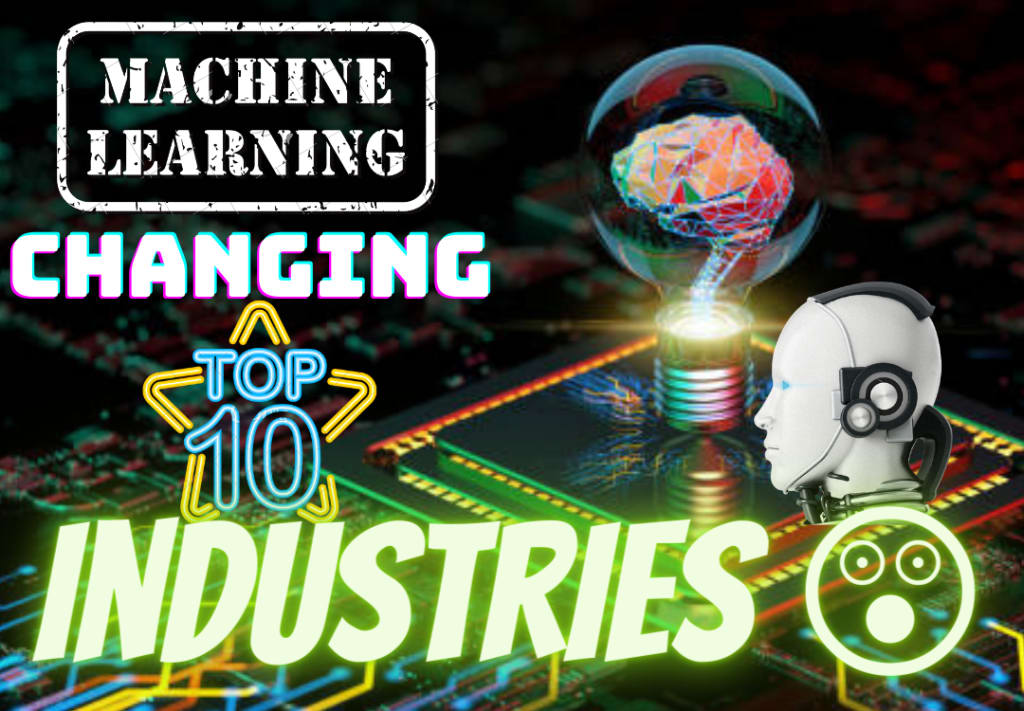Machine Learning Changing Top 10 Industries
How Machine Learning is Changing Industries

Introduction:
In the past decade, machine learning has emerged as a transformative technology that is revolutionizing industries across the globe. From healthcare to finance, transportation to entertainment, the impact of machine learning algorithms and models is reshaping the way we live and work. In this article, we will explore the remarkable advancements and applications of machine learning, highlighting its transformative power in various sectors.
1》👉 Healthcare:
Machine learning has had a profound impact on the healthcare industry, enhancing diagnostics, treatment plans, and patient care. Medical professionals now have access to powerful algorithms that can analyze vast amounts of medical data to detect diseases, identify patterns, and predict outcomes. Machine learning algorithms are being used for early detection of cancer, personalized medicine, and improved patient monitoring. With the ability to analyze complex medical images and genomic data, machine learning is enabling more accurate diagnoses and tailored treatment plans.
2》👉 Finance:
Machine learning is revolutionizing the financial sector by enabling more accurate predictions, fraud detection, and risk assessment. Algorithms can analyze large volumes of financial data to identify patterns and anomalies, helping financial institutions make better investment decisions and manage risks effectively. Machine learning models are also being used to detect fraudulent activities in real-time, saving millions of dollars for banks and credit card companies. Additionally, chatbots powered by machine learning algorithms are providing personalized financial advice to customers, enhancing customer experience and engagement.
3》👉 Transportation:
The transportation industry is undergoing a significant transformation with the advent of machine learning. Self-driving cars, powered by advanced machine learning algorithms, are becoming a reality. These algorithms can process real-time data from sensors and cameras, enabling vehicles to navigate roads safely and efficiently. Machine learning is also optimizing logistics and supply chain management, improving route planning, and reducing delivery times. Additionally, ride-sharing platforms are leveraging machine learning to match drivers and passengers, enhancing the overall transportation experience.
4》👉 Entertainment:
Machine learning is revolutionizing the entertainment industry by personalizing content recommendations and improving user experiences. Streaming platforms use machine learning algorithms to analyze user preferences, viewing patterns, and demographic data to provide personalized content suggestions. This enables users to discover new movies, TV shows, and music that align with their interests. Machine learning is also being used to create virtual reality (VR) and augmented reality (AR) experiences, enhancing gaming and entertainment possibilities.
5》👉 Manufacturing:
In the manufacturing sector, machine learning is driving automation, optimizing production processes, and improving quality control. Machine learning algorithms can analyze sensor data from machines and production lines to predict failures and schedule maintenance proactively. This reduces downtime and maximizes productivity. Additionally, machine learning is enabling predictive maintenance, where algorithms can identify potential issues before they occur, preventing costly breakdowns. Furthermore, quality control processes are being enhanced by machine learning algorithms that can identify defects and anomalies, ensuring higher product quality.
6》👉 Retail:
Machine learning is revolutionizing the retail industry by providing personalized recommendations based on customer data, optimizing pricing strategies through dynamic pricing models, and improving supply chain management through demand forecasting. It enables fraud detection to protect businesses and customers, enhances customer service through chatbots and virtual assistants, and uses image and voice recognition for visual search and voice-activated commands. Machine learning also enables sentiment analysis to understand customer feedback, virtual try-on experiences, and augmented reality applications. By leveraging machine learning, retailers can offer personalized experiences, optimize operations, and make data-driven decisions, ultimately enhancing customer satisfaction and driving profitability.
7》👉 Energy and Utilities:
Machine learning is transforming the Energy and Utilities industry by optimizing energy usage, predicting equipment failures, improving grid management, and enabling smart energy systems. Machine learning algorithms can analyze historical energy consumption data, weather patterns, and other relevant factors to optimize energy distribution, reduce waste, and increase efficiency. Predictive maintenance models can detect patterns and anomalies in equipment data to predict failures, enabling proactive maintenance and minimizing downtime. Machine learning also facilitates grid management by analyzing data from smart meters, sensors, and IoT devices, allowing for real-time monitoring and better load balancing. Ultimately, machine learning empowers the Energy and Utilities sector to improve sustainability, reduce costs, and enhance overall performance.
8》👉 Agriculture:
Machine learning is revolutionizing the Agriculture industry by providing advanced analytics and insights for improved crop yield predictions, resource allocation, disease and pest detection, and precision farming techniques. By analyzing historical data, weather patterns, soil conditions, and other relevant factors, machine learning models can generate accurate predictions for crop yields, helping farmers optimize their planting strategies and improve productivity. Machine learning algorithms can also optimize resource allocation, determining the precise amount of water, fertilizer, and pesticides needed for specific crops and fields, leading to cost savings and environmental benefits. Additionally, machine learning can detect diseases and pests early on by analyzing images or sensor data, enabling timely intervention and reducing crop losses. Precision farming techniques such as automated irrigation systems and robotic harvesting can also be enhanced by machine learning, allowing for more efficient and precise agricultural practices.
9》👉 Education:
Machine learning is reshaping the Education industry by personalizing learning experiences, providing intelligent tutoring systems, automating administrative tasks, and enabling adaptive learning platforms. By analyzing student data, machine learning algorithms can create personalized learning paths, adapting to each student's needs, strengths, and weaknesses. Intelligent tutoring systems leverage machine learning to provide individualized feedback and recommendations, enhancing student understanding and performance. Machine learning can automate administrative tasks like grading and scheduling, saving time for educators. Adaptive learning platforms use machine learning to dynamically adjust content and activities based on student progress, maximizing engagement and learning outcomes. Overall, machine learning is revolutionizing education by tailoring instruction, automating processes, and improving student outcomes.
10》👉 Cybersecurity:
Machine learning is transforming the Cybersecurity industry by enhancing threat detection, identifying patterns of malicious activities, improving anomaly detection, and enabling proactive defense mechanisms. Machine learning algorithms analyze vast amounts of data to detect and classify cyber threats in real-time, reducing response times and improving accuracy. By continuously learning from new data, machine learning models can identify previously unknown threats and adapt to evolving attack methods. Anomaly detection algorithms can detect abnormal behavior patterns, helping to identify potential security breaches. Machine learning also enables proactive defense mechanisms, such as automated incident response and behavior-based authentication systems, strengthening overall cybersecurity posture and providing better protection against cyber threats.
Conclusion:
Machine learning is undoubtedly transforming industries across the board. Its applications in healthcare, finance, transportation, entertainment, manufacturing, retail, Energy and Utilities, Agriculture, education, and cybersecurity are revolutionizing processes, improving efficiency, and enhancing user experiences. As machine learning continues to evolve, its impact will become even more significant, opening up new possibilities and transforming industries in ways we couldn't have imagined. Embracing this technology and leveraging its power will be key for businesses and professionals to stay competitive and drive innovation in the future.






Comments
There are no comments for this story
Be the first to respond and start the conversation.